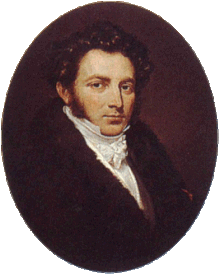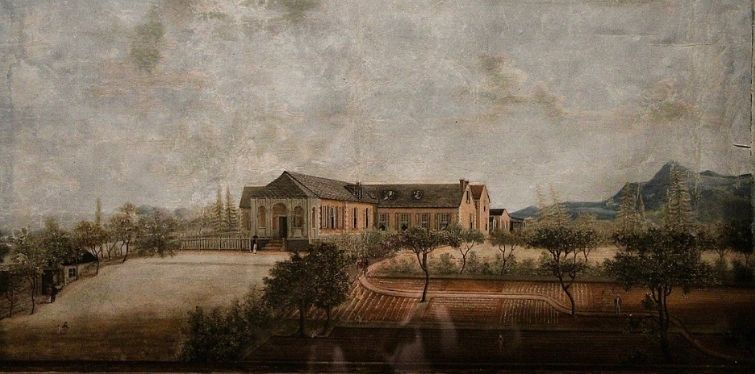This is the first of a two part guest post by our good friend Josh Provan about Napoleon's final days in St Helena before his death on 5 May 1821. Josh is a history blogger and author who runs the Adventures in Historyland blog as well as a talented artist who has created several designs on our store, including a special Napoleon 200th anniversary design available on mugs and T-shirts. Check out other products featuring Josh's designs here.

Napoleon Bonaparte has now been dead for 200 years and most of the articles you will read will be talking about his life; what he achieved and what his legacy is today. This is a very proper and eulogistic approach for such a figure and in a sense therefore, Napoleon, having already been buried twice, is getting another funeral. But amongst the debate and commemoration, his actual death will not be commemorated. Despite the fanfare that attends the name of Napoleon to this day his death did not match the scale of his life. Indeed a debate still rages about how the former emperor died, and so the question of how he did leave this reality is still a valid one to ask two centuries later.
Given how many perceive him, the mundane horror of Napoleon’s passing, though in a way much more relatable to many today than a ‘glorious’ death on a 19th century battlefield, is not something a lot of people expect. He didn’t die of a tropical disease, nor can it be adequately be proven that he was poisoned, which might at least add some macabre sheen of glamour. A stroke or a heart attack didn’t carry him off in the middle of his usual routine without warning, instead he probably succumbed to a creeping, insidious disease that too few people understood in 1821 and with only the most basic treatments to make the last months bearable.
In writing this post it has been difficult not to just make it a long list of vaguely conflicting medical observations, because in truth that is what the last five days of Napoleon’s life boil down to, and in looking at them I trust you will see what I mean.
St Helena and Longwood.
Shortly after Napoleon Bonaparte was declared dead and his will had been read, Charles Tristan, Comte de Montholon wrote a very short note to his jailor:
‘The Emperor Napoleon died today, May five, eighteen hundred and twenty one, at ten to six, after a long and painful illness. I had the honour to play a part. He has authorised me to communicate to you, if you wish, his last wishes. I ask you to let me know what are the provisions prescribed by your government for the transport of his body in Europe, as well as those relating to the persons of his suite.’
Having been informed of the death of the man the British government was pleased to call General Bonaparte, Lieutenant General Sir Hudson Lowe, Governor of St Helena, went down to Longwood House to ensure all was as had been reported. The next day he wrote to Earl Bathurst to inform him that Britain’s most prestigious prisoner had vacated what the said prisoner called his abode of darkness and crime.
‘It falls to my duty to inform your lordship that Napoleon Bonaparte expired at about 10 minutes before six o’clock in the evening of the 5th of May, 1821 after an illness which had confined him to his apartments since the 17th March last. He was attended during the early part of his indisposition from the 17th to the 31st March, by his own medical assistant, Professor Antommarchi alone. During the latter period, from the 1st April to the 5th May, 1821, he received the daily visits of Dr. Arnott, of his majesty’s 20th Regiment, generally in conjunction with Professor Antommarchi. Dr. Short, physician to the forces and Dr. Mitchell principal medical officer of the Royal Navy on this station, whose services, as well as any other medical persons on the island, had been offered, were called upon in consultation by Professor Antommarchi on the 3rd of May, but they had not any opportunity afforded them of seeing the patient.’
The Patient’s first physician on St Helena had been Doctor Barry O’Meara of HMS Bellerophon, and he described the island as a small, scarified eminence of brown lava-rock buffeted by the south east trades that no one save those desperate for land after a long voyage was ever happy to see. It had one town with exalted bridle paths for roads, and a prickly collection of inhabitants who subsisted on a base diet of salted meat, fish and rice supplied mostly by the East India Company.
Napoleon’s abode; Longwood House, he described as a desolate place, monotonously irritated by the south easterly wind, and was usually either hidden by semi regular fogs or lashed with rain. He said it was known by the locals as a being only a semi-permanent abode for anyone but what we would call a manic depressive. And indeed it had previously been used by British governors as a getaway for the pleasant months of the year.

A view of Longwood House attributed to Louis Joseph Marchand, valet to Napoleon.
Napoleon himself devoted some time to recording the weather and found only a handful of days of ‘fine weather’ appearing during the late summer months, the rest being an uninspiring drizzle. The house itself was built on open plain of cloying dark clay, populated by a few mournful gum trees and a preponderance of weed like scrub-growth, it had what passed for good weather for six months of the year but sweltered for two, and for the other seven or eight it was overcast, wet and windy. The rooms were adequate but stuffy and prone to mould and famously it was infested with rats. For these reasons and multiple others it was a hopeless place to contemplate eking out the rest of your life.
O’Meara offered the observation that the Longwood plain was uninhabited until Napoleon arrived and gave this as evidence for how poor a place for a permanent abode it was. The doctor later decided, based on the sick list of the garrison and reports of new arrivals that the climate encouraged inflammations of the liver, intestines and bowels.
1 May 1821.

Francis Carlo Antommarchi, personal physician to Napoleon, c1836.
Doctor Francis Carlo Antommarchi had to pay close attention to find the patient's pulse. The reassuring thudding cadence that indicated life was so weak that it was barely detectable. To his relief the doctor finally found it but the relief soon changed to anxiety as he recorded that Napoleon Bonaparte’s heart was making one hundred pulsations per minute.
The former emperor’s breathing was shallow and difficult, and in making some abdominal examinations Antommarchi found a ‘spasmodic rising of the stomach and epigastric region,’ and his anxiety, which had been on the rise for some time now conceding Napoleon’s declining health rose. An enema was administered which brought on a ‘copious evacuation’ according to the Surgeon of the 20th Foot, Archibald Arnott.
Napoleon had slipped into a delirious state and every now and then ‘spoke incoherently.’ He babbled nonsensically about shopping for oranges and people he disliked on the island. If anything the symptoms got worse as the night wore on, the former master of Europe had been in this state since the early morning so it was a relief when the symptoms eased a little towards the middle of the night, allowing the ailing invalid of Longwood a few hours quiet rest.
2 May
At 2 am, Napoleon began showing signs of fever and the delirium returned in a more forceful and prolonged bout, ‘Napoleon spoke incessantly of France,’ Antommarchi remembered ‘of his son, of his companions in arms: “ … Desaix, Massena! Ah, Victory is declaring! Run! Hasten press the charge; they are ours!”’
The doctor and Napoleon’s attendants listened to his raving with understandable distress, recalling his words to them in April when he had said that while they would get to see their families again, while he would join his dead comrades in the Elysian Fields. ‘There will be pleasure in that,’ he had said.
Then suddenly he jumped up and declared he must go into the garden. The action was so abrupt that no one was fast enough to stop him actually rising from his bed and trying to stand.
The act was however futile. He was a quarter of the considerable weight he had been a year ago and with very little strength. Napoleon’s legs crumpled beneath him and he fell to the floor. Dramatic as the event seems, the emperor’s valet and ‘second Mameluke’ Louis Etienne St Denis, perhaps predictably had no memory of allowing the emperor to fall and recorded in his memoir that his attendants caught him just in time. Either way, the assembled carers begged him to go back to bed but the emperor’s faculties were dimmed and he recognised nobody. He continued to rant in his delusions and insisted he had to go for a walk in the garden until his strength wore out and he could be laid back onto the mattress. Antommarchi recording 180 pulsations per minute, nausea and an elevated temperature. At 9am Napoleon regained his senses but remained very weak and was sure his end was coming. He instructed the doctor to ‘Proceed very carefully with the anatomical examination,’ after his death and to pay special attention to the stomach as he believed he suffered from a ‘syrocys of the pylorus’ which he said was hereditary in his family and he hoped the examination might spare his son from the same end.
‘Doctor, I am very ill.’ Napoleon gulped through his near constant hiccoughs about three hours later after bout of agitation, ‘I feel I am going to die,’ then the delirium seized him again and he was lost to the world.
Antommarchi was a Corsican like Napoleon, rather well qualified and recommended by Napoleon’s mother to replace O’Meara as his personal physician in 1818, but Napoleon didn’t have great confidence in his abilities. Unsure as to the specific ailment but suspecting Hepatitis, Antommarchi administered an anodyne draught of orange flower water mixed with a few drops of tincture of opium and ether to ease his suffering, a prescription that Doctor Archibald Arnott said he advised. The draught revived Napoleon, who seems to have been so delirious he could not object as in April he had snapped at Arnott ‘No! England calls for my corpse; I will not keep her waiting, and shall die very well without drugs.’
The patient seemed conscious and feeling up to making adjustments to his will, to which he was constantly making amendments before he grew too infirm, but when he tried to do so he discovered he was so weak he could not make his limbs respond and the attempt had to be given up. St Denis recalled that on or around this day he received General Bertrand’s wife.
‘Ah, Madame Bertrand!’ He said as she entered the salon. His simple camp bed had been moved there earlier in his illness because his usual sleeping quarters were too stuffy.
‘How is your Majesty?’ she asked. ‘Aie, gently,’ was the response, and though he looked at her directly he said no more.
At 9pm he partook of what had become a habitual meal, 2 biscuits and a glass of diluted wine, to which he would usually show his satisfaction by repeating with some effort ‘ah, how good wine is.’ By the end of the day everyone at Longwood was convinced that there was no hope, and the doctor observed that efforts to show their devotion redoubled amongst the little imperial court at Longwood. Anything that might upset him was removed, including a portrait of his son, the king of Rome which seemed to agitate him more than calm him, as he kept looking at the place where it had been and then to whoever was nearby as if to ask ‘what have you done with my son?’

Louis Joseph Marchand, Napoleon's valet
Antommarchi, Napoleon’s other valet, Louis Joseph Marchand, and St Denis had been taking turns to sit up with Napoleon since his condition had grown acute, a task made more trying because the ailing man could not stand the light and so ‘we were obliged to lift him up, and to administer all the cares his state required in the midst of a profound obscurity.’ They were also apparently still moving him back to the study or library during the day a task which became impossible as the days wore on.
At length everyone in the household would take turns to sit up with one of the principal carers or senior attendants so that they could themselves rest a little, not that the constant hiccough that accompanied his every waking hour wouldn’t have keep them alert.
Touched by their devotion during in his moments of clarity, Napoleon constantly asked for many of them to receive some reward in his will, up to and including gardeners who obviously hadn’t seen the emperor since 17 March. ‘My poor Chinese,’ Napoleon blurted out, referring to the labourers who saw to a lot of the chores around the Longwood estate, ‘do not let them be forgotten neither. Let them have a few scores of Napoleons. I must take leave of them also.’
The first five Napoleonic Impressions customers based in the UK who spend at least £30 can receive a free copy of historical fiction novel Napoleon's Drop by Michael Fass, set during Napoleon's exile in St Helena. For more information about the offer, click here.



Share and get 15% off!
Simply share this product on one of the following social networks and you will unlock 15% off!